update 21.
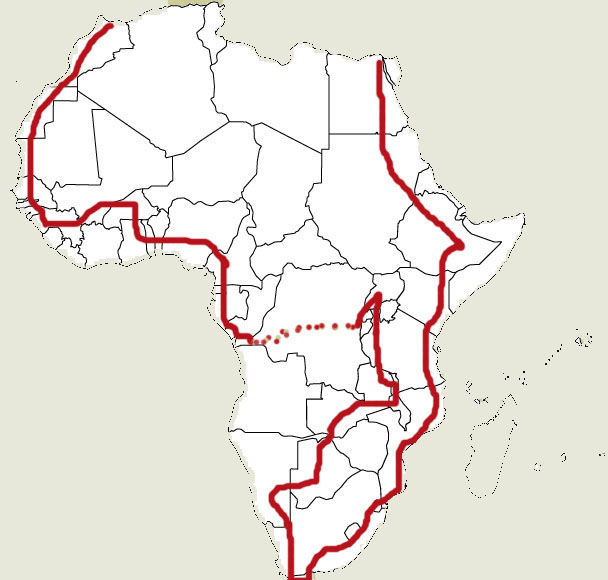 the road
north
the road
north
8 January 2008
Total kilometers cycled: 33,114
South Africa & Lesotho
Specific country info on routes & roads/food & accommodation/the locals available here.
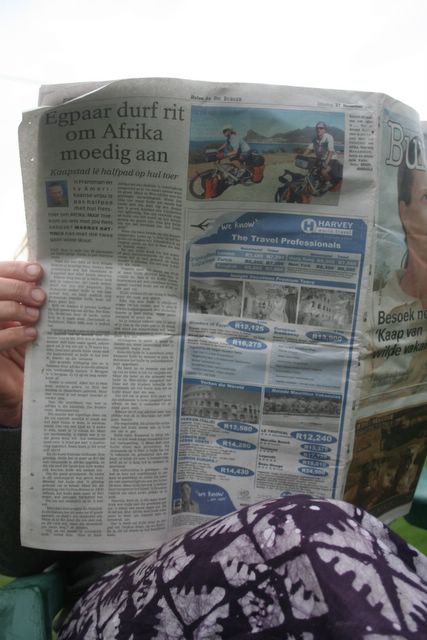 South Africa's infrastructure is by far the best on the continent and
there are plenty of paved, pothole-free roads. But Eric is always
keen to shorten the route and I'll do anything to avoid the busy
highways, so we decide to
take a shortcut and find ourselves battling gravel on a quiet road
traversing the Cape farmlands. There's a toot and a wave and we
pull over to see what's up.
South Africa's infrastructure is by far the best on the continent and
there are plenty of paved, pothole-free roads. But Eric is always
keen to shorten the route and I'll do anything to avoid the busy
highways, so we decide to
take a shortcut and find ourselves battling gravel on a quiet road
traversing the Cape farmlands. There's a toot and a wave and we
pull over to see what's up. 'Aren't you the couple I saw in the newspaper?' asks the kindly voice.
'Oh, yes that must be us. We're touring Africa,' we reply, our heads swelling with sudden pride at being recognized.
'You must stop at my farm down the road for tea,' insists the farmer's wife.
That's typical of South African hospitality. Ask if you can pitch your tent in the garden, and you're offered a room in the house. Pull off the road for a rest, and some kind soul's bound to pull up and ask if you if you don't need a lift to the next town. Pull out your peanut butter and bread for a snack at a rest stop, and the travelers at the adjoining table will spoil you with home-made rusks, ham sandwiches and hot coffee. Ask for directions to the campsite, and you'll be invited to the family home for the night. One gentleman who passed as we were cycling under the scorching sun of the Free State, actually went home, prepared two big bottles of ice water and then drove back present us with the refreshing drinks. We've been showered with kindness during our three months in South Africa and we love it!
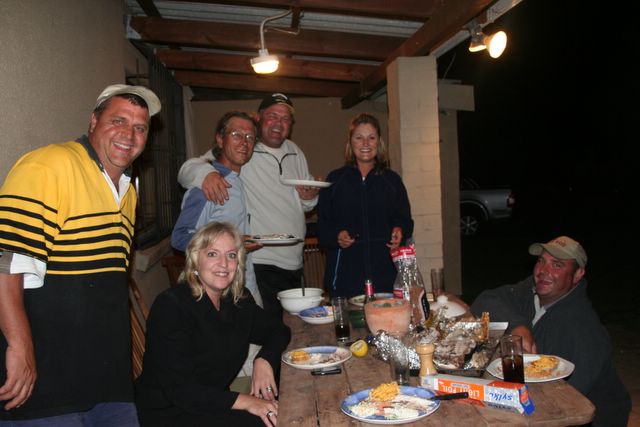 But unfortunately all is not well in the Rainbow Nation and the country is still
struggling in the post-apartheid era. It's a spectacular summer
morning, the sun is shining, the sea is
sparkling and an invigorating breeze blows in off the Atlantic.
Spirits are high and we haven't a care in the world as we commence Part 2:northward bound of
our African adventure. Eric stops to take photos of the
waves crashing in to the rocky shore just meters from the coastal
highway and I cycle on ahead. Suddenly, a police car--lights
flashing and siren wailing just like in the movies-- pulls off to the
side of the road just ahead of me . Uht-oh. Something's
amiss. Anticipating trouble, I put on my friendliest face and
most ingratiating tone of voice which is reserved for cops and
small-time officials.
But unfortunately all is not well in the Rainbow Nation and the country is still
struggling in the post-apartheid era. It's a spectacular summer
morning, the sun is shining, the sea is
sparkling and an invigorating breeze blows in off the Atlantic.
Spirits are high and we haven't a care in the world as we commence Part 2:northward bound of
our African adventure. Eric stops to take photos of the
waves crashing in to the rocky shore just meters from the coastal
highway and I cycle on ahead. Suddenly, a police car--lights
flashing and siren wailing just like in the movies-- pulls off to the
side of the road just ahead of me . Uht-oh. Something's
amiss. Anticipating trouble, I put on my friendliest face and
most ingratiating tone of voice which is reserved for cops and
small-time officials.
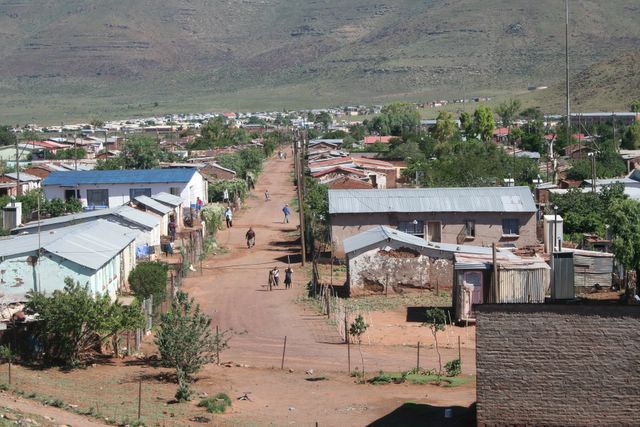 Gooood Moorning, Sir! I
call out in greeting, not sure if kowtowing is the most effective way
of dealing with South African authorities. Is he stopping me to
enforce some helmet law? Maybe there's a cycle path somewhere
I've missed and he wants to fine me for unlawful use of a highway.
Could it be the old standby about not having license plates on my
bike?
Gooood Moorning, Sir! I
call out in greeting, not sure if kowtowing is the most effective way
of dealing with South African authorities. Is he stopping me to
enforce some helmet law? Maybe there's a cycle path somewhere
I've missed and he wants to fine me for unlawful use of a highway.
Could it be the old standby about not having license plates on my
bike? 'This is a dangerous highway,' I'm informed by the stout "coloured" policeman standing beside his shiny vehicle.
'Oh, yes, the traffic is horrendous,' I agree wholeheartedly, relieved that the officer is only concerned about my safety and isn't looking for some quick cash in order to turn a blind eye at some supposed infraction on my part.
'No, no, that's no what I mean,' he responds impatiently, rolling his eyes at my obvious naivety.
'The highway is dangerous because the people living beside the highway are dangerous. You mustn't stop for the next 30 kilometers.'
'Oh, yes, I see. What will up happen if I do stop?' I ask in all innocence.
'You'll be robbed, no doubt. Just keep pedaling.'
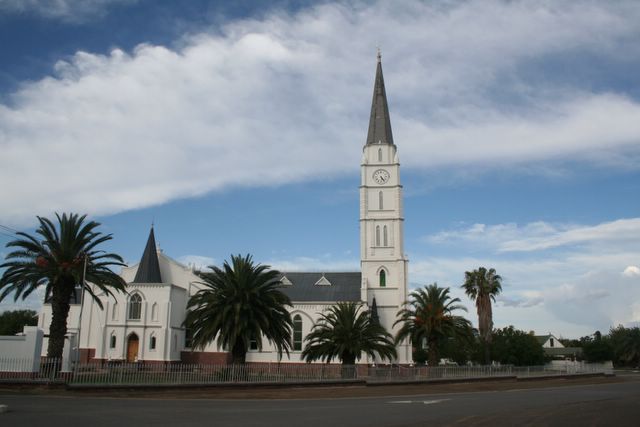 And
I do. Right on by Khayelitsha, one of South Africa's most
notoriously dangerous townships. We're a mere 30 kilometers from
first world Cape Town
with its trendy eateries, upscale shopping malls and posh seaside
mansions, but this is an entirely different South Africa. The
township dwellings closest to the highway are a mishmash of materials
that appear to have been hastily cobbled together. Young men
loiter by the roadside and children play in patches of bare earth
outside their ramshackle homes. In the distance, conditions improve and
the identical government-built houses are of the sturdier variety and
even connected to a central electrical line. The bleak, matchbox
dwellings
seem to stretch on forever and I wonder how many thousands of poor
South Africans have been squeezed into this one tightly-packed area.
Maybe the police officer was exaggerating a bit, and although we've traveled the entire length of Africa without any
serious problems or threats, I don't dare stop to chat with the locals. We've already heard too many tales of violence
to take the risk.
And
I do. Right on by Khayelitsha, one of South Africa's most
notoriously dangerous townships. We're a mere 30 kilometers from
first world Cape Town
with its trendy eateries, upscale shopping malls and posh seaside
mansions, but this is an entirely different South Africa. The
township dwellings closest to the highway are a mishmash of materials
that appear to have been hastily cobbled together. Young men
loiter by the roadside and children play in patches of bare earth
outside their ramshackle homes. In the distance, conditions improve and
the identical government-built houses are of the sturdier variety and
even connected to a central electrical line. The bleak, matchbox
dwellings
seem to stretch on forever and I wonder how many thousands of poor
South Africans have been squeezed into this one tightly-packed area.
Maybe the police officer was exaggerating a bit, and although we've traveled the entire length of Africa without any
serious problems or threats, I don't dare stop to chat with the locals. We've already heard too many tales of violence
to take the risk.In fact, most South Africans we've met seem to be slightly obsessed with security. First, there was the concerned man in
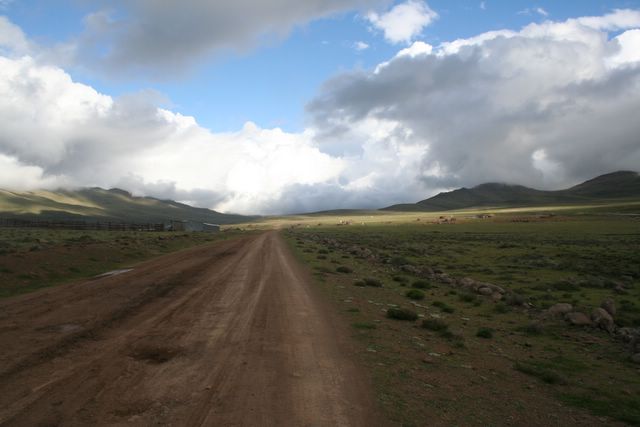 the Springbok
supermarket who came rushing up to us as we were eying all the cakes
on offer at the in-store bakery.
the Springbok
supermarket who came rushing up to us as we were eying all the cakes
on offer at the in-store bakery.'Where are your bikes? Where are your bikes?' he sputtered. 'I saw you riding into town just now. I hope the bikes haven't already been stolen! Tourists must be very careful in this country,' he warned.
Later that day at the campsite the burly retired farmer in the caravan next to us sauntered over, lowered his voice and inquired, 'Are you armed?
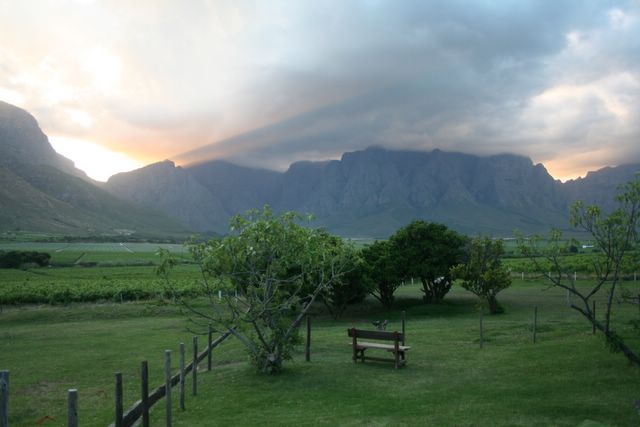 You
gotta be armed in this country. At least buy
yourself some pepper spray if you don't want to carry a real
weapon.' And more than once passing motorists have flagged us down
to warn us of potential dangers ahead.
You
gotta be armed in this country. At least buy
yourself some pepper spray if you don't want to carry a real
weapon.' And more than once passing motorists have flagged us down
to warn us of potential dangers ahead. Houses in the suburbs are hidden behind high walls and electric fences. Signboards meant to deter criminals boast that homes are protected by Armed Response units and many neighborhoods have banded together to hire private security guards to walk the beat or monitor incoming and outgoing traffic. All this crime concern is contagious. Soon I take the concerned farmer's advice and kit myself out with some pepper spray--guaranteed to keep would-be robbers and rapists at bay.
It may be some time before the Rainbow Nation lives up to it's catchy nickname. Although officially apartheid has been banished for more than a decade, as a passing tourist one sees little in the way of integration or redistribution of wealth. Admittedly, European and North American cities also have their pockets of ethnic groups, but the situation in South Africa appears more pronounced. The leafy suburbs where we are invited to stay are almost entirely white. Black or "coloured" women arrive early in the day to keep the houses spic and span and the 'garden boys' ensure a well-manicured lawn. Businesses we frequent are almost all run by whites, with blacks to do the manual labor and menial tasks. The current government is trying to redress the situation through black empowerment programs which reserve university slots and give preferential employment treatment to the previously disadvantaged. Now the tables have turned and young, educated whites are leaving in droves as they find themselves shut out of the job market. They take their skills to the UK, Australia and America and now South Africa is left with a shortage of engineers and medical staff.
There's a preoccupation with race that can be felt throughout the country. Eric's gone to sort out accommodation and I'm sitting on a wooden bench outside the white-owned shop in what is predominately a rural black town of the Eastern Cape. It's like being in a time warp and I see little of the progress that is apparent in more affluent, urban areas. The cars are old and battered, the few shops lining the streets are shabby--a 'China Shop' selling cheap imported goods, a liquor store, protected by burglar bars and a security guard, which looks to be doing a brisk business and an appliance store run by an Indian. Three young boys come out of the grocery shop and eye me slurping away on my ice pop. I know that the bench is 'their' spot and they look both confused and perturbed. White women obviously don't sit outside of shops and fritter away the afternoon. They arrive by car, do their shopping and then retreat to the security of their homes. The few whites who pass nod in my direction, but I can feel their disapproval. I scoot over and make room for the boys, who reluctantly take their seats beside me. I chance a bit of small talk and by the time Eric returns the tension has eased and I'm cheerfully chatting with the locals who have come to admire our bikes and enquirer about our journey. They all agree that we're slightly crazy.
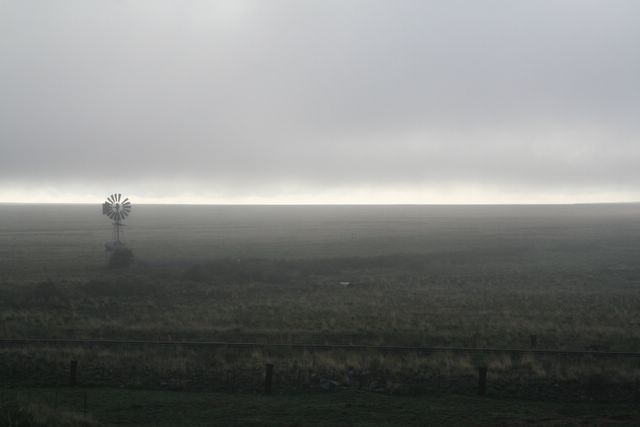 The
Garden Route, winding its way along the rugged coast, is South
Africa's best-known tourist trail. December is peak holiday
season and
we're not up to the hassles of crowds and congested highways, so we head
inland through the Karoo. First through the fertile valleys, farmlands
and vineyards of the Little Karoo and then on to the vast open spaces
of the Great Karoo. This lonely land is inhabited only by hardy
merino sheep and determined Afrikaans farmers. The highway stretches on
for hours without a settlement in sight. We worry about where
we'll sleep and how we'll refill our fast diminishing supplies of
water. But the farmers are friendly, albeit a bit gruff,
and they never turn us down when we ask to pitch our tent. Hard
living has made them tough, and one woman comes out of her farm house
brandishing a pistol. When she sees that we're just two harmless
cyclists, she apologizes profusely for the scare she's caused.
Not long ago, she explains, they discovered an escaped murderer lurking about
her property. Her edginess is understandable.
The
Garden Route, winding its way along the rugged coast, is South
Africa's best-known tourist trail. December is peak holiday
season and
we're not up to the hassles of crowds and congested highways, so we head
inland through the Karoo. First through the fertile valleys, farmlands
and vineyards of the Little Karoo and then on to the vast open spaces
of the Great Karoo. This lonely land is inhabited only by hardy
merino sheep and determined Afrikaans farmers. The highway stretches on
for hours without a settlement in sight. We worry about where
we'll sleep and how we'll refill our fast diminishing supplies of
water. But the farmers are friendly, albeit a bit gruff,
and they never turn us down when we ask to pitch our tent. Hard
living has made them tough, and one woman comes out of her farm house
brandishing a pistol. When she sees that we're just two harmless
cyclists, she apologizes profusely for the scare she's caused.
Not long ago, she explains, they discovered an escaped murderer lurking about
her property. Her edginess is understandable.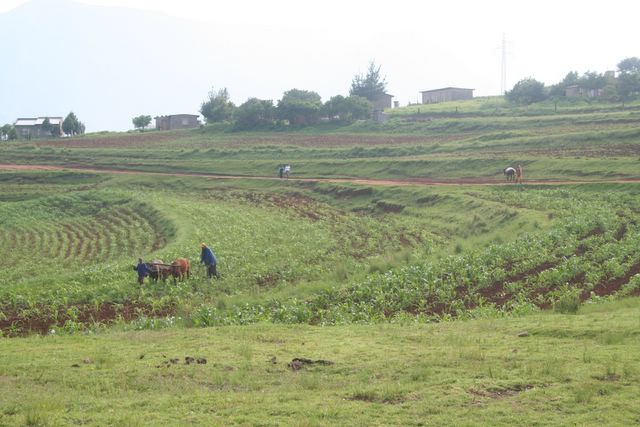
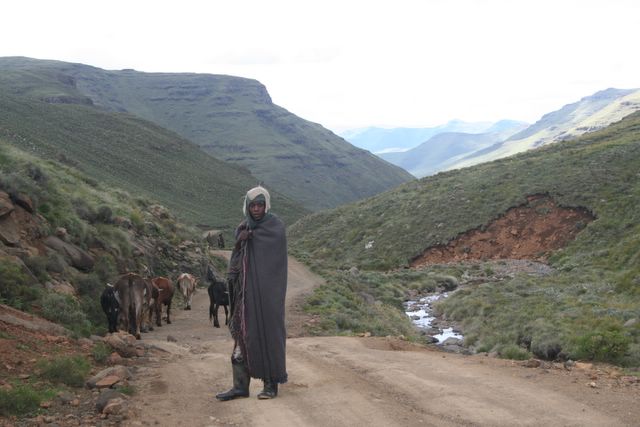
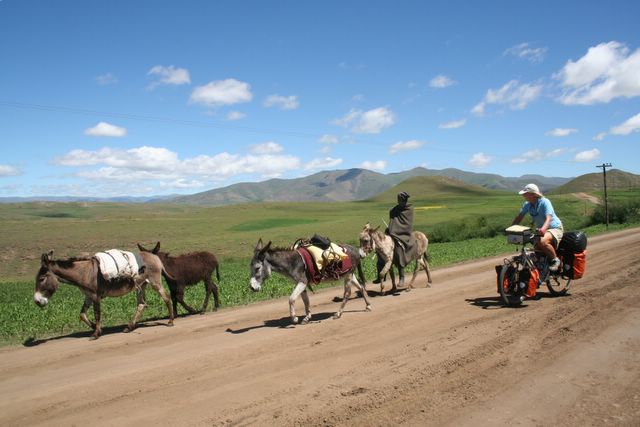
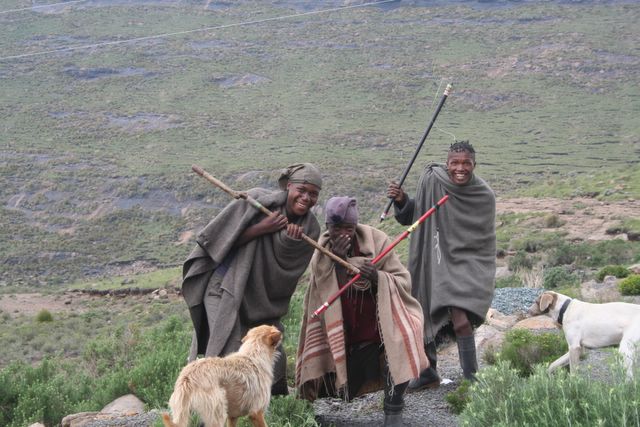
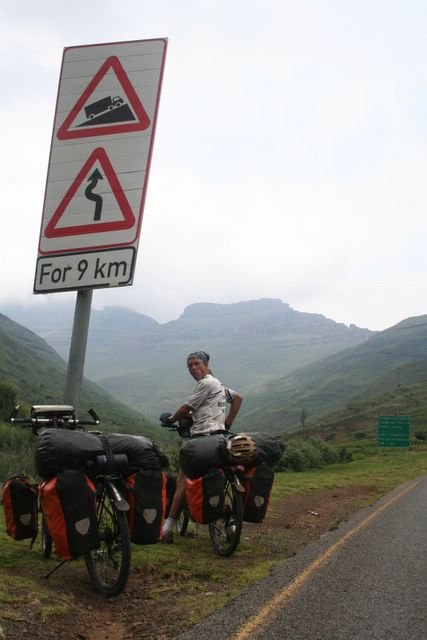
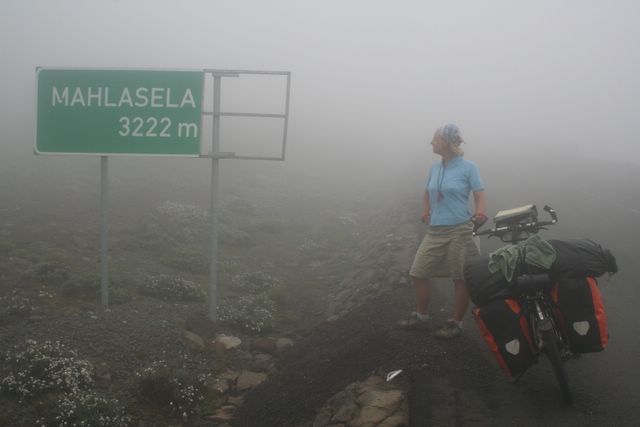 Soon
we're riding through the arid farmlands and prairies of the Free
State and then slowly we begin to make out the mountains of
Lesotho rising in the distance. We're back in the third world
again and the children are clamoring for money, sweets. soap, pens and
panties. Most anything will do. There's no modern farm
machinery and the plowing is done with the help of an oxen team.
There are proud men on horseback and timid boys riding donkeys, all
wrapped in a thick traditional blanket designed to keep the cold and
rain out. Higher and higher we climb and it feels like we're
riding right through the roof
of Africa. The scenery is spectacular, but our legs burn as
we conquer gradients of up to 35%. Pride won't let us push and we
slowly inch our
Soon
we're riding through the arid farmlands and prairies of the Free
State and then slowly we begin to make out the mountains of
Lesotho rising in the distance. We're back in the third world
again and the children are clamoring for money, sweets. soap, pens and
panties. Most anything will do. There's no modern farm
machinery and the plowing is done with the help of an oxen team.
There are proud men on horseback and timid boys riding donkeys, all
wrapped in a thick traditional blanket designed to keep the cold and
rain out. Higher and higher we climb and it feels like we're
riding right through the roof
of Africa. The scenery is spectacular, but our legs burn as
we conquer gradients of up to 35%. Pride won't let us push and we
slowly inch our 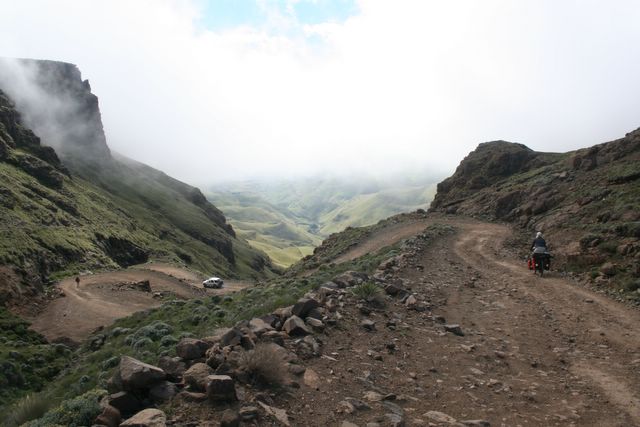
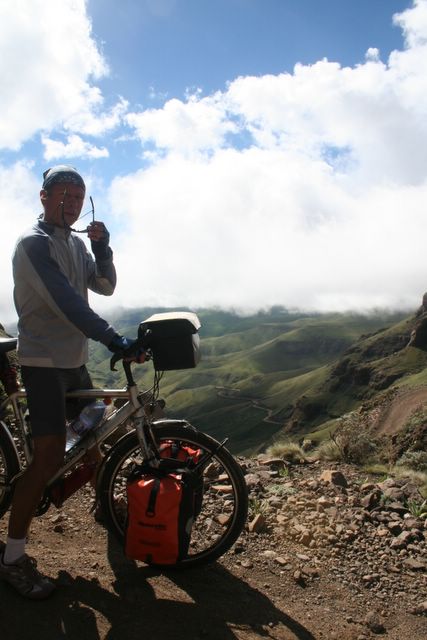 way
up the unbelievably steep passes. Christmas Eve is spent at more than 2,500
meters, huddled in the tent, praying the heavy rains will come to halt.
The 25th is cool and misty and we are almost lost in the thick
fog that envelops us as we twist and wind our way along the highest
road in Africa. We are relieved when we stumble upon a government
compound tucked away in a small village and the vivacious young woman
left in charge over the holidays offers us shelter for the night in one of the vacant
residences.
way
up the unbelievably steep passes. Christmas Eve is spent at more than 2,500
meters, huddled in the tent, praying the heavy rains will come to halt.
The 25th is cool and misty and we are almost lost in the thick
fog that envelops us as we twist and wind our way along the highest
road in Africa. We are relieved when we stumble upon a government
compound tucked away in a small village and the vivacious young woman
left in charge over the holidays offers us shelter for the night in one of the vacant
residences. We are blessed with sun the following morning and, with a half dozen mountain passes behind us, we finally come to the mother of all passes: Sani Pass. This one is trickier because we've left the smooth, tar highway behind and are tackling this climb on a rough gravel road. We spend the night at Sani Top, and the next morning maneuver our way down the steep cork-screw turns and hair-pin bends that bring us back to South Africa.
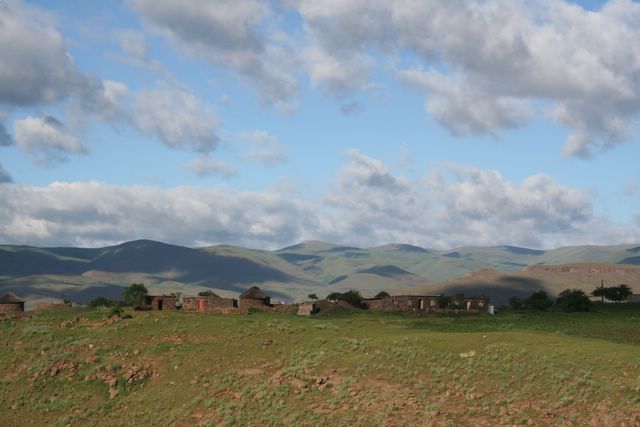
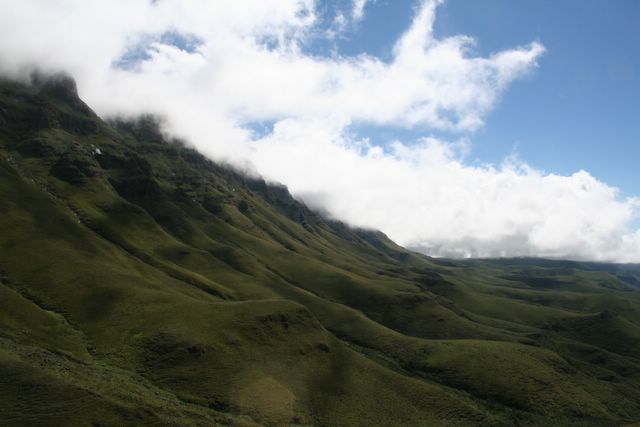
The plan is to continue further north towards Swaziland and then on to Mozambique. We're crossing the fertile Natal Midlands, but the sugar fields and sheep ranches can't hold my interest and the cycling is sheer drudgery. Thoughts of comfortable beds and well-stocked fridges are dancing in my head and the mere idea of a 3,000 kilometer ride through Mozambique in the stifling summer heat makes me shudder. Eric 's keen to continue, but with the outbreaks of violence in Kenya and news of flooding and refugees in Mozambique, he finally relents and we agree to put Africa on hold.
Plans are always subject to change, as they say, and our revised course will bring us to South India. We're both in need of some time off the bikes and hope to find projects to suit us in the international community of Auroville. Time to give our bodies a rest and do some mental working out instead. But don't despair if you've grown used to your monthly dose of our tall African tales. The flight tickets are return--expect your next World Biking Africa update sometime in July.
thank you.
We've been especially blessed over the past month. A special thanks to:Fanie and Barbara in Bloemfontein for their friendship and kindness during our stay in Bloemfontein.
Robin and Karen in Pietermaritzburg for offering hospitality to two weary strangers in need of rest and the warm atmosphere of a family.
Frans and Marthie in Eshowe for opeining up their home to us and showing us the sights in Zululand.
Barry, Moreshnee and Joy in Westville for a pleasant stay and fantastic Indian cuisine.
Adrian in Durban for the great seaside accomodation, trips to the gym and help sorting out various problems.
contact us at: worldbiking@gmail.com
Support our chosen charity and help educate girls in Africa-more info here
